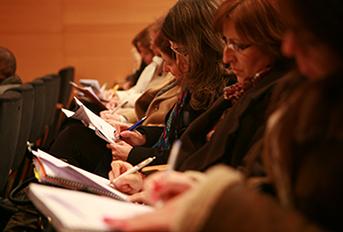Associação Portuguesa de Investigação em Cancro
«Cancer – Educate to Prevent» – High-School Teachers, the New Promoters of Cancer Prevention Education Campaigns
«Cancer – Educate to Prevent» – High-School Teachers, the New Promoters of Cancer Prevention Education Campaigns

«Cancer - Educate to Prevent» project arises from the need to design and validate effective and comprehensive new strategies in the area of cancer prevention.
The project was focused on training teachers, providing them with skills to implement campaigns on the prevention of cancer. After the training, the 54 teachers involved in the project, promoted cancer prevention campaigns at their school communities, covering a total number of 42 schools in the Northern and Central regions of the country, encompassing a universe of over 5,000 students.
The impact evaluation of this initiative showed a significant increase in the knowledge and perceptions about cancer in schools communities, which validates the relevance and feasibility of this innovative model.
Authors and Affiliations:
Ana Barros1,2 Luís Moreira3 Helena Santos4 Nuno Ribeiro1 Luís Carvalho1 Filipe Santos-Silva1,5
1Public Awareness of Cancer Unit, Cancer Institute of Pathology and Molecular Immunology of University of Porto – Ipatimup, Porto, Portugal.
2Faculty of Sciences of University of Porto – FCUP, Porto, Portugal.
3Department of Research Methodology and Data Analysis, Health School of Vila Nova de Gaia – Piaget Institute, Vila Nova de Gaia, Portugal.
4Autonomous Section of Social Sciences, Faculty of Economics of the University of Porto – FEP, Porto, Portugal.
5Department of Pathology and Oncology, Faculty of Medicine of the University of Porto – FMUP, Porto, Portugal.
Abstract:
Cancer is one of the leading causes of death worldwide, and thus represents a priority for national public health programs.
Prevention has been assumed as the best strategy to reduce cancer burden, however most cancer prevention programs are implemented by healthcare professionals, which constrain range and educational impacts. We developed an innovative approach for cancer prevention education focused on high-school biology teachers, considered privileged mediators in the socialization processes. A training program, ‘‘Cancer, Educate to Prevent’’ was applied, so that the teachers were able to independently develop and implement prevention campaigns focused on students and school-related communities. The program encompassed different educational modules, ranging from cancer biology to prevention campaigns design. Fifty four teachers were empowered to develop and implement their own cancer prevention campaigns in a population up to five thousands students. The success of the training program was assessed through quantitative evaluation – questionnaires focused on teachers’ cancer knowledge and perceptions, before the intervention (pre-test) and immediately after (post-test). The projects developed and implemented by teachers were also evaluated regarding the intervention design, educational contents and impact on the students’ knowledge about cancer. This study presents and discusses the results concerning the training program ‘‘Cancer, Educate to Prevent’’ and clearly shows a significant increase in teacher’s cancer literacy (knowledge and perceptions) and teachers’ acquired proficiency to develop and deliver cancer prevention campaigns with direct impact on students’ knowledge about cancer. This pilot study reinforces the potential of high school teachers and schools as cancer prevention promoters and opens a new perspective for the development and validation of cancer prevention education strategies, based upon focused interventions in restricted targets (students) through non-health professionals (teachers).
Journal:
Plos One
Link:
http://www.plosone.org/article/info%3Adoi%2F10.1371%2Fjournal.pone.0096672




